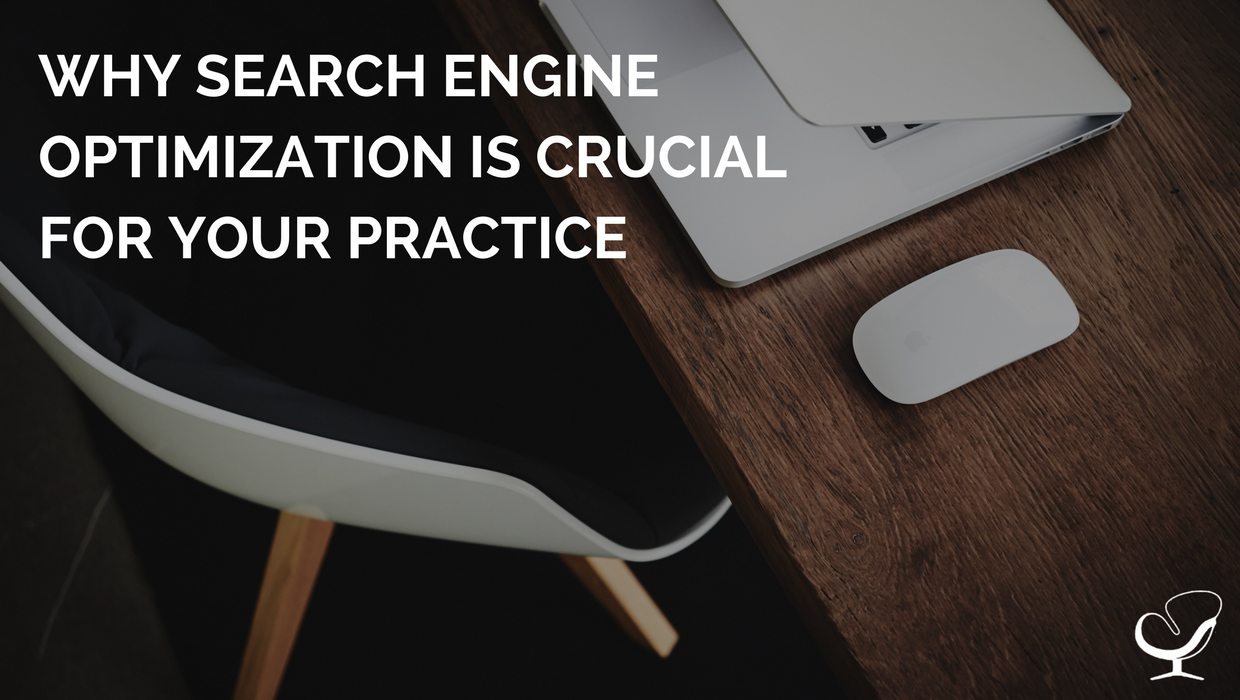When I was working towards my masters degree in marriage and family therapy, I never once thought about how I would need to optimize my website so that I ranked high in online search results. Professors didn’t go over how to create a Google business listing, how to run a
Yelp profile, or why it’s important to regularly blog. Sure, I learned a lot about how to sit in a room and talk to someone. But I had no idea how to start a small healthcare business and master digital marketing. There really should be a course on that in grad school. Am I right?
The act of making changes to your website so that it ranks high in search results is called search engine optimization, or SEO. Applying SEO to your website, as a therapist or wellness provider, is incredibly important. With the vast majority of folks going to Google to find their next healthcare practitioner, it is vital that your website shows up when someone performs a search for the service that you provide.
A Brief History Lesson on Google
Waaaaay back in the day, in the late 90’s when Google arrived on the scene, online search was pretty basic. Webpages were ranked in order according to how many times a search term appeared on a webpage. For example, if a colleague of yours made a website for their practice and used the phrase “couples counseling” 15 times on their website they might rank pretty high in search results if someone entered “couples counseling” into Google’s search engine. But you could easily outrank them if you made a website that displayed “couples counseling” 20 times. Suffice it to say, ranking high in search results back then was just as easy as finding music videos on MTV (which was really easy).
Tragically, the 90’s came to an end and with the new decade came a more complicated algorithm created by Google. Understandably, search rankings needed to be more sophisticated. Google’s (literally) billion dollar idea was to count links as votes. The more links on the internet that pointed to your website, the higher you would rank for matching search terms. As long as your website had those matching search terms, which are called keywords, in the right places and a bunch of people linked to you, you could easily sit at the top of the search results.
As the decade went on, and MTV became increasingly unrecognizable, Google continued to perfect their search results. Not only were they able to figure out what neighborhood the searcher was performing the search in, but they became better at understanding the intention and goal of the search. Google no longer only paid attention to the singular search being done, they paid attention to all of the user’s past searches and the websites that had been visited recently. Google was able to create a web profile for you and serve you up results that would match exactly what you wanted based on your tastes and preferences. Creepy? Yes of course. But search results became a lot more accurate the more they were personalized.
More recently, Google has been able to understand how to read websites better and truly understand what they are offering and then match that with searcher’s queries, even if those queries don’t use the exact words that are on the resulting websites. For example, if a searcher Googles “winter blues” they’ll be met with websites that have information about seasonal affective disorder. Google understands they are synonyms and the person probably wants to find information about SAD.
Be Obvious
The “winter blues” search will only yield websites with information about SAD. You won’t see provider websites that come up in search results. Google clearly understands the difference between a purely informational website and practitioner’s website. Until recently, that wasn’t always the case. Google knows if you are a therapist in a specific town who specializes in winter blues and 90’s MTV nostalgia. And if Google doesn’t know, it’s your fault.
Even though Google might be the smartest robot in the world, it still needs some help from you, the website owner, to clue it in on important things you’d like it to know about you. That’s why it is important to be as obvious as you possibly can on each page of your website. You need to clearly communicate through the words on each page of your site that you are a therapist that works in a specific neighborhood and treats a specific issue or provides a specific service.
Your couples counseling page should be all about how you’re a practicing couples counselor. Your page on depression should revolve around how you treat depression. The about page should be about your education and experience as a counselor. Your contact page should be about how to make an appointment for counseling services. Get the idea? Every page should speak to who you are as a counselor. Any page that Google visits should contain all the information it needs to determine that you’re a counselor who is available to see clients.
Final Takeaway
Think about how Google will understand your website. Think about what search terms you want to show up for in online searches. Use those terms, plus their synonyms, to create copy for each page of your site. Focus on creating rich, quality copy that Google, along with visitors to your site, will appreciate reading.
There can be a lot that goes into SEO and ranking high in search results. You can really get lost in the weeds if you overthink it. The best idea is to create straightforward content that your potential clients can easily understand and that will resonate with them. Something MTV abandoned a long time ago and has since paid the price. Be the MTV of the 90’s. Not the MTV of today.
Visit www.thepracticeacademy.com for more info.
 Jeff Guenther, LPC, is a therapist in Portland, OR. He has been in private practice since 2005 and currently leads workshops on how health and wellness practitioners can build their digital brand and attract more clients online.
Jeff Guenther, LPC, is a therapist in Portland, OR. He has been in private practice since 2005 and currently leads workshops on how health and wellness practitioners can build their digital brand and attract more clients online.

